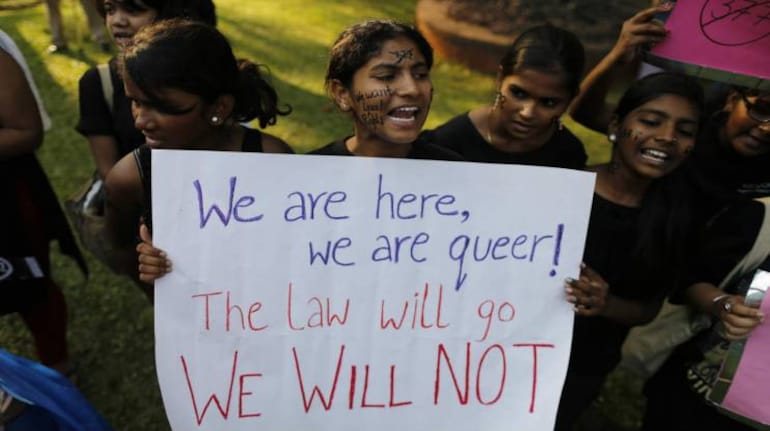Context
-
Section 377 of IPC criminalises consensual private sexual acts between adults. It came into force in 1862. Lawyers have argued that the notorious Criminal Tribes Act, 1871, which branded a number of marginalised population groups like transgenders as “innately criminal” before it was repealed, drew inspiration from Section 377. Though the 172nd report of the Law Commission of India recommended the deletion of Section 377, no action was taken.
-
Despite judicial verdicts, India’s sexual minorities face discrimination in employment, health issues and personal rights.
LGBTQ+ community
- In India, the LGBTQ+ community is still a stigmatised and invisible minority, a fact that is alarmingly incompatible with the country’s living, liberal and inclusive Constitution.
- The Constitution was conceived by India’s founding fathers as a beacon of fundamental rights, leading once enslaved Indians to the promised land of life and freedom. Despite such a liberating Constitution, the Indian state and the law have been abusing and given many marginalised segments of the citizenry such as the queer community of India the cold shoulder.
What is section 377 of IPC?
- Section 377 of the Indian Penal Code criminalized homosexuality. This Section was introduced in 1861 during the British rule in India, modeled on the Buggery Act of 1533.

Source: Money Control - Navtej Singh Johar & Ors. vs Union of India (2018) case: The Supreme Court ruled that the criminalization of consensual homosexual sex, under Section 377 between adults was unconstitutional, irrational, indefensible, and manifestly arbitrary.
- However, Section 377 remains in force for sex with minors, non-consensual sexual acts, and bestiality.
Launch pad for jurisprudence
- Naz Foundation v. Govt. of NCT of Delhi [2009] is a landmark Indian case of the Delhi High Court.
- It held that treating consensual homosexual sex between adults as a crime is a violation of fundamental rights.
- As a result of the ruling, homosexual acts between consenting adults are no longer illegal in India.
- The court also held that Section 377 offended the guarantee of equality enshrined in Article 14 of the Constitution, because it creates an unreasonable classification and targets homosexuals as a class
- Suresh Kumar Koushal vs. Naz Foundation [2013]: In this case, the SC overturned the previous judgment by Delhi HC 2009 and reinstated Section 377 of the Indian Penal Code.
- Despite the judgments of the Supreme Court, full equality is still a pie in the sky for the queer community in India.
Legal sanction opposed
- The Union of India has recently opposed any move to accord legal sanction to same-sex marriages in India stating that the decriminalisation of Section 377 of the Indian Penal Code does not automatically translate into a fundamental right for same sex couples to marry.
- This was stated in response to the Delhi High Court notice to a plea by LGBTQ+ activists and couples who sought recognition of same-sex marriages.
- As of 2021, same-sex marriage is legally performed and recognised in 29 countries. Indian society and the state should synchronise themselves with changing trends.
Learning from Mandela’s nation
- In May 1996, South Africa became the first country to constitutionally prohibit discrimination based on sexual orientation.
- The United Kingdom passed the “Alan Turing law” in 2017 which ‘granted amnesty and pardon to the men who were cautioned or convicted under historical legislation that outlawed homosexual acts’.
- To expiate the excesses committed against the LGBTQ+ community in the past and present, the Indian state should also enact a law on these lines to do justice to the ‘prisoners of sexual conscience’.
Way Forward
- Justice Rohinton F. Nariman had directed in Navtej Singh Johar & Ors., the Government to sensitise the general public and officials, including police officials, to reduce and finally eliminate the stigma associated with LGBTQ+ community through the mass media and the official channels.
- Amending Article 15 which secures the citizens from every sort of discrimination by the state, on the grounds of religion, race, caste, sex or place of birth or any of them. This Article is the cornerstone of the concept that equality is the antithesis of discrimination. Imbibing the zeitgeist, the grounds of non-discrimination should be expanded by including gender and sexual orientation.
- School and university students too should be sensitised about the diversity of sexuality to deconstruct the myth of heteronormativity. Heteronormativity is the root cause of hetero-sexism and homophobia.
Conclusion
- It is time for change; but the burden should not be left to the powers that be. The onus remains with the civil society, the citizenry concerned and the LGBTQ+ community itself.
Constitution & Polity Current Affairs : Click Here
